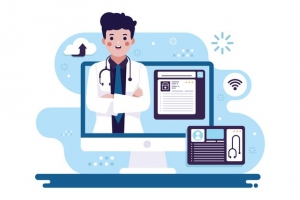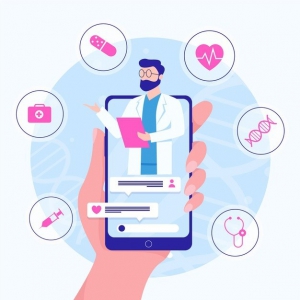
Over the last decade, the healthcare industry has shown a sea change in adopting Technological trends. Those days are gone when people used to visit a doctor to consult them. Now, they can consult a doctor anytime at their ease with the help of mHealth Mobile apps.
The mHealth industry is running and there are around 44k+ healthcare apps in the App Store. Various healthcare mobile apps exist for different purposes like data analytics, appointment booking, telemedicine, meditation, and so on. With such diversity, Users use their device, not only to track the number of burned calories but also to get a consultation from a medical specialist.
mHealth mobile apps are among the top revenue contributors for the businesses. According to the stats, the global mHealth market is expected to hit $59billion by the end of 2020, which was near about $6.7billion in 2012. As we have noticed that the mHealth market is growing rapidly, businesses are increasingly getting inclined towards the development of a mHealth mobile app.

Before jumping into its development cost, let us take a quick look at the mHealth mobile apps types & features:
Kinds of mHealth Mobile Apps:- Patient & Doctor’s App
- Chronic Care Apps: Those people who are suffering from a disease like Blood Pressure, Diabetes, Cancer, Tumour, and other similar diseases need regular consultation and treatment. For them, Chronic mHealth Apps are the best option to monitor their situation.
- Medical Apps: These apps are diagnostic apps that bring awareness to patients and doctors. These apps create alerts and also act as a medical reference for both physicians and patients.
- Fitness Apps: These apps are designed to manage and track nutritional information of the patients like calorie intake, daily workout details, heartbeats, weight loss/gain, etc. Users have access to get regular healthcare and fitness tips via push notifications.
- Medication Apps: These types of apps are designed for reminder purposes. These apps help to remind the patients about specific activities that need to be done, for taking the daily dose of prescribed medications, etc. This will help patients in fast recovery with on-time medications.
- Clinical Communication Apps: These apps are designed for enabling a smoother communication between patients and clinical specialists in particular hospitals. This app includes voice and chat process, file sharing, video calling, and electronic health record systems.
- Women’s mHealth Apps: These apps are specially designed only for women to get in touch with the doctor for booking an appointment and also getting consultations regarding their menstrual cycle, pregnancy, fertility, breastfeeding, infant care, etc.
- Emergency Care Apps: These apps are designed to help people to reach their nearest hospitals in case of any emergency. This app provides detailed information like directions to reach the nearest clinic, its travel time, doctor’s availability and waiting time, etc.
- Pregnancy Apps: These apps help users to track records of their scheduled appointments with doctors. It also educates pregnant patients on infant care, information on prenatal and postnatal, precautions and safety measures, etc.
- Risk Assessment Apps: These apps are integrated with Electronic Health Records and wearable devices which are used to monitor patients’ health conditions in real-time, tracking heart rate, and identifying patients at risk.

Must-have Features of mHealth Mobile Apps:
- Login Page/User Profile: The first and foremost important feature in a mHealth app is its login page and user profile. It is a page where the user will log in to the app by entering details like name, gender, age, mobile number, and email address, etc. Besides this, the app can also ask the user to enter more information like their height, weight, and whether they are suffering from any specific disease, blood pressure, etc. This acts as a personal health chart of the patient.
- Doctor’s Profile: Another important feature of the app is the doctor’s profile which tells the name of the doctor, his/her specialization such as cardiologist, gynecologist, or general physician, the location of the clinic or the name of the hospitals with which they are attached to, the specific days and timings, etc.
- Advanced Searching Option: This is by far the most important feature of the app as it allows patients to search for specific doctors for specific locations and specific diseases based on their needs. For instance, if they are suffering from a cardiac problem, they would search a cardiologist for a particular location.
- Scheduling Appointments: Now once the user selects a doctor for consulting, the next step would be booking an appointment. While booking an appointment, the patient has to fill out a form where they need to mention their name, age, gender, their problem, its visible symptoms, their past medical history, and so on.
- In-built Payment Options: As we are moving towards a cashless, in-built payment gateway option, it is allowing the users to pay the charges for consultation fee hassle-free. A secured and reliable payment gateway boosts user engagement.
- Geo-Location: This is the must-have feature in a mHealth app for sure as it helps the patients to reach the doctor’s clinic or the concerned hospital through the shortest route and within minimum time.
- Video-Conferencing: Another important feature in a mHealth app is video-conferencing which allows users to consult the specified doctor if they are not nearby or in emergencies.
- Strong Database: This feature stores all the important Electronic Medical Records at one place. whether it be your X-Ray or the ECG report, doctor prescription, the nutrition chart, etc.
- Reminders: Another feature of a mHealth app is the reminders that give an alert to its users about taking a daily dose of prescription or to do specific activity for their wellness.
How Much Does It Cost:
Before coming into an assumption of its costing, proper evolution of apps platform, app size, app features, app Tech, app developers, etc is to be done. According to the tech experts, the price for a mHealth app ranges between $30,000-$70,000.

































